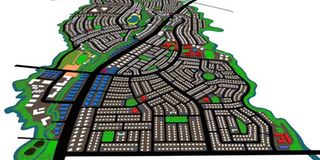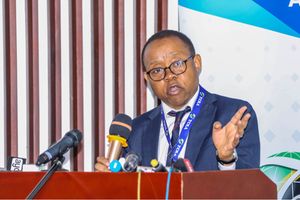Arusha Plans new Bondeni Satellite City

This is how the planned BondeniCity Satellite City in Arusha will look like upon completion.
What you need to know:
Billed as the most ambitious, strategic and grand project in recent history, the BondeniCity Satellite City, which is located 15km South West of the Arusha’s Central Business District (CBD), is anticipated to raise the profile of Tanzania’s safari capital.
Arusha. Arusha City Council in partnership with an investor in real estate is coming up with an ultra-modern satellite city in a bid to offer the populaces planned settlements.
Billed as the most ambitious, strategic and grand project in recent history, the BondeniCity Satellite City, which is located 15km South West of the Arusha’s Central Business District (CBD), is anticipated to raise the profile of Tanzania’s safari capital.
Currently, 80 per cent of the population of Arusha live in unplanned areas.
Arusha City Council Executive Director, Athumani Kihamia told the visiting parliamentary committee led by the Minister for Lands, Housing and Human Settlement Development, Mr William Lukuvi that the idea of BondeniCity is not only to have formal habitation areas, but also to beautify Arusha, the pearl of country’s tourism and diplomatic activities.
Visibly impressed by the elegant project executed through Public, Private Partnership (PPP) model, Minister Lukuvi and some MPs commended the Arusha Council and the investor for the great idea and the job well done.
“The BondeniCity Satellite City will complement government’s long term plan to regulate urban population as well as ease pressure on Arusha's CBD, the headquarters for the East African Community," Mr Kihamia explained.
Experts say that judging from a land use perspective, satellite cities and urban infill development are the best ways to accommodate population growth while preserving open space and farmland. The alternative to this is urban sprawl.
One of the project directors, Mr Omar Iddi Omar said that the proposed BondeniCity Satellite City will be developed on a farm located at Oljoro area, close to Arusha CBD and will be having all prerequisite facilities.
“The proposed BondeniCity Satellite City project site comprises of an area covering some 1100 Acres. The survey of the area indicates, the site is made up of two sides separated by a major road going through lower Oljoro JKT farms and beyond to Simanjiro” said Mr Omar who is also a prominent Lawyer based in Arusha.
The farm, which in acreage terms is divided, almost equally on both sides of the road, is currently accessed from the Mbauda junction and it sits 10km from this junction and in total 15km from the Arusha clock tower roundabout.
The first 8km of the road from Mbauda is tarmac and the remaining stretch is a good all weather road.
However, there are plans by Tanzania Roads Agency (Tanroads) to extend the tarmac beyond the farm up to the JKT farms. It is understood that the new Arusha ring road, under construction, crosses the famous CCM hill 500 metres north of BondeniCity, which will create better access to the property.
Analysts say that the satellite City’s location is one of the most prime sites at the moment by virtue of its being near the city centre and by its size and the fact that it has a relatively flat landscape.
“The land is lower in elevation than main Arusha and lends to spectacular views of Mount Meru and Mount Kilimanjaro on a clear day,” said Mr Omar.
According to him, the general topography of the site is relatively flat with a gentle inclination on the western side and the highest point is the homestead, which is surrounded by lovely mature trees.
The development of the proposed BondeniCity Satellite City would relate to the developments in various surrounding areas of Majengo, Burka, and Arusha town.
The approved master plan shows that the principles of sustainable development should form the foundation for new development within BondeniCity including; social progress, ecological balance, economic growth, heritage and cultural conservation.
The proposed development would be able to address high population growth challenges facing Arusha City, infrastructure and utilities requirements, consider social integration, encourage and facilitate home ownership to different social groups, provide economic opportunities whilst taking consideration of environment and best practice.
Whereas phase one, which comprises 139 acres will be inaugurated next month, the remaining part will be put into the market in June 2018.
The city is also putting key infrastructures typically characterizes technical structures such as roads, bridges, water supply, sewers, electrical grids, telecommunications including internet connectivity and broadband speeds and so forth and can be defined as the physical components of interrelated systems providing commodities and services essential to enable, sustain, or enhance societal living conditions.




